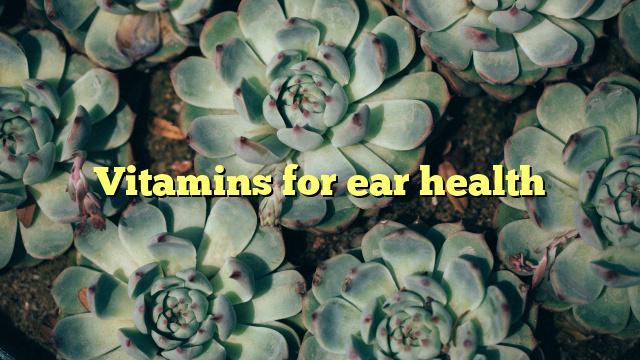Our ears are essential sensory organs that allow us to hear the sounds of the world around us. Just like any other part of our body, our ears require proper care and attention to stay healthy. While we often focus on keeping our ears clean and protecting them from loud noises, we may not always consider the role that vitamins play in maintaining ear health.
1. Vitamin A
Vitamin A is crucial for maintaining the health of the middle ear and helps to prevent ear infections. It also plays a role in maintaining the lining of the inner ear that is responsible for converting sound waves into signals that our brain can interpret. Good sources of vitamin A include carrots, sweet potatoes, spinach, and liver.
2. Vitamin C
Vitamin C is an antioxidant that can help prevent ear infections and reduce the risk of hearing loss. It also supports the immune system, which is essential for fighting off infections that can affect the ears. Foods rich in vitamin C include oranges, strawberries, kiwi, and bell peppers.
3. Vitamin E
Vitamin E is known for its antioxidant properties and can help protect the cells in the inner ear from damage. It also supports blood circulation, which is important for delivering oxygen and nutrients to the ear tissues. Nuts, seeds, and leafy greens are good sources of vitamin E.
4. Vitamin D
Vitamin D plays a role in reducing inflammation in the ear and can help prevent conditions like otitis media. It also supports the absorption of calcium, which is important for maintaining the bones in the middle ear. Sunlight exposure and fortified foods like milk and cereal are good sources of vitamin D.
5. Omega-3 Fatty Acids
Omega-3 fatty acids are essential for reducing inflammation in the body, including the ear. They can help prevent conditions like otitis externa and tinnitus. Fatty fish like salmon, walnuts, and flaxseeds are excellent sources of omega-3 fatty acids.
Conclusion
Ensuring that you are getting an adequate intake of vitamins and nutrients is essential for maintaining ear health. By including foods rich in vitamin A, C, E, and D, as well as omega-3 fatty acids in your diet, you can support the health of your ears and reduce the risk of ear infections and hearing loss.
FAQs
1. Can vitamin supplements help improve ear health?
While it is always best to get your vitamins from whole foods, supplements can be a good option for individuals who may not be getting enough nutrients from their diet. Consult with a healthcare provider before starting any new supplements.
2. Are there any vitamins that can worsen ear health?
While vitamins are generally beneficial for overall health, excessive intake of certain vitamins like vitamin A and E can be harmful. It is important to consume these vitamins in moderation and follow recommended guidelines.
3. Can vitamin deficiencies lead to hearing loss?
Deficiencies in certain vitamins like vitamin B12 and folate have been linked to hearing loss. It is essential to maintain a balanced diet to ensure you are getting all the nutrients your body needs for optimal ear health.
4. How long does it take for vitamin supplements to improve ear health?
The time it takes for vitamin supplements to have an effect on ear health can vary depending on the individual and their overall health. Consistent intake of vitamins over a period of weeks to months is generally recommended for noticeable improvements.




